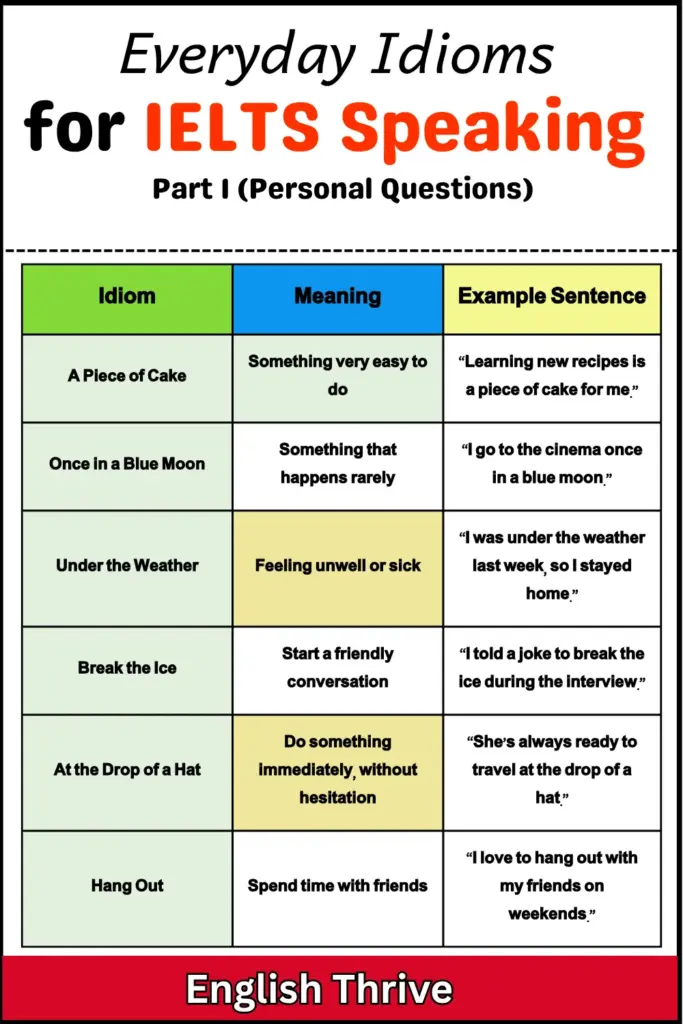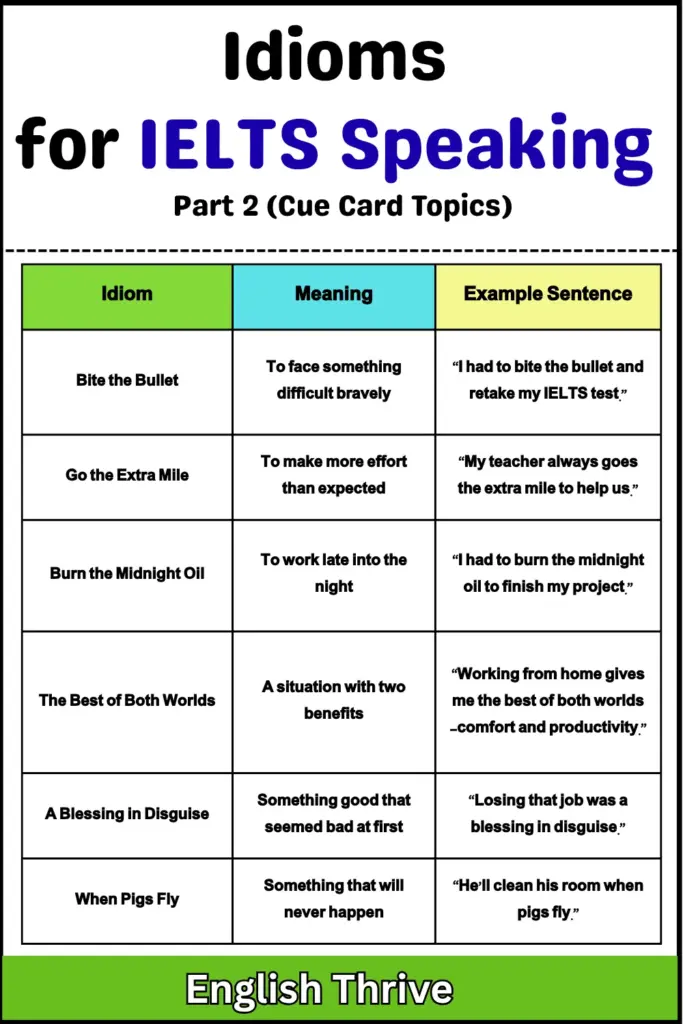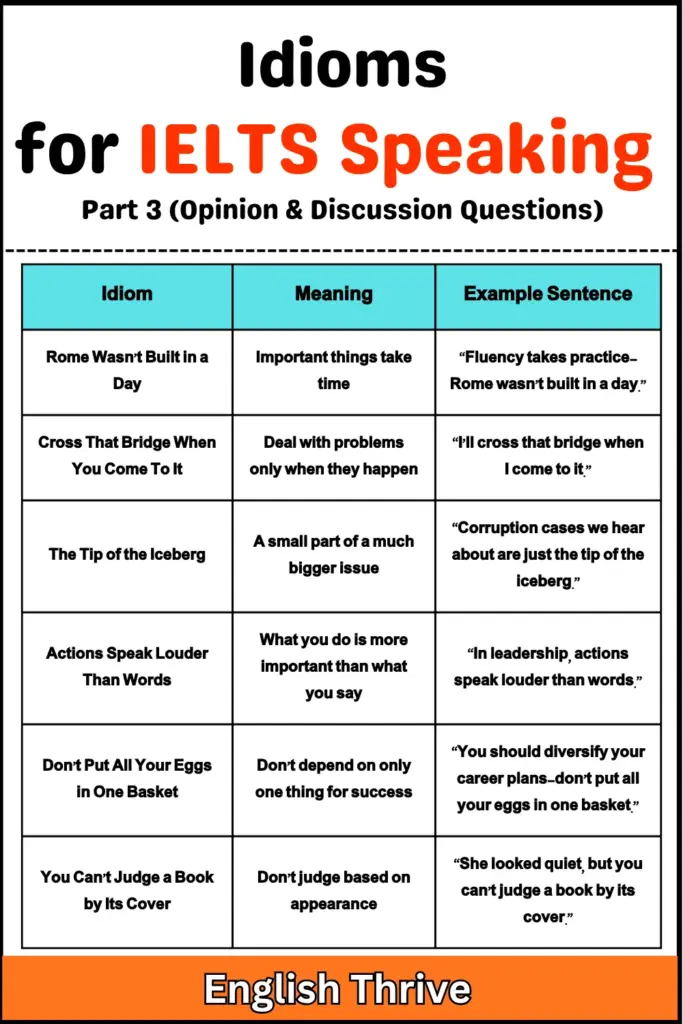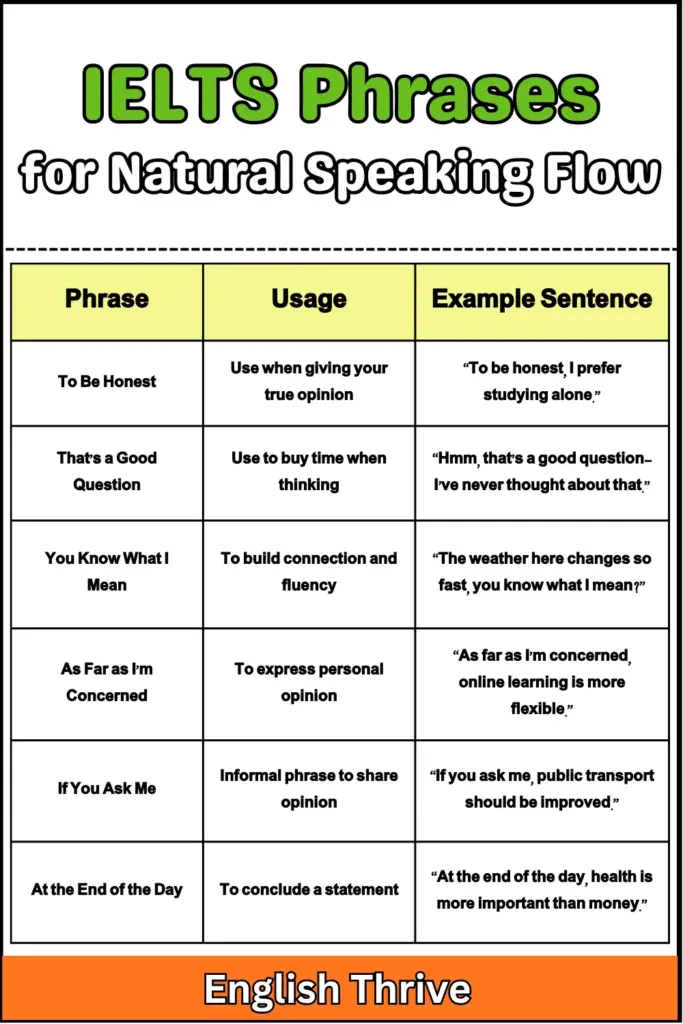If you’re preparing for the IELTS Speaking test, you’ve probably heard that using idioms and phrases can help you sound more fluent and natural. But here’s the truth — idioms are not magic words that instantly give you a Band 9. They only work when used accurately and naturally in the right context.
Idioms are expressions that don’t mean exactly what their individual words suggest. For example, when someone says “It’s a piece of cake,” they don’t mean dessert — they mean something is very easy. Native speakers use idioms all the time, so when you use them correctly, you show that you understand real, conversational English.
In this guide, we’ll explore the most useful IELTS Speaking Idioms and Phrases, their meanings, and real examples that help you sound confident, natural, and ready for Band 9-level fluency.
Contents
ToggleWhat Are Idioms and Phrases in IELTS Speaking?
Definition of Idioms and Phrases
Idioms are fixed expressions or groups of words whose meanings are different from the literal meaning of each word.
For example:
- “To hit the books” means to study hard, not physically hitting books.
- “Break the ice” means to start a friendly conversation, not breaking actual ice.
Phrases, on the other hand, are short expressions or combinations of words that convey specific ideas. They may not be idiomatic but are still natural and conversational — for example:
- “As far as I’m concerned…”
- “That’s a good question…”
- “In my opinion…”
Both idioms and phrases show fluency, lexical resource, and communication range — three key factors in the IELTS Speaking Band Descriptors.
Why Idioms Matter in IELTS Speaking
Idioms can play an important role in your IELTS Speaking test — but only if used wisely. Here’s how they help:
1. They Show Natural, Native-like Fluency
Native speakers naturally use idiomatic language in conversations. When you use idioms appropriately, it signals to the examiner that you can understand and communicate in authentic English, not just textbook English.
Example:
Instead of saying, “It’s very easy for me,” you can say:
“Oh, that’s a piece of cake for me!”
2. They Demonstrate a Strong Lexical Resource
Using idioms correctly shows that you know advanced vocabulary and flexible expressions. This helps boost your Lexical Resource score — one of the four marking criteria in IELTS Speaking.
Example:
Instead of saying, “I work hard,” you could say:
“I often burn the midnight oil to complete my tasks.”
3. They Make Your Speech More Engaging and Expressive
Idioms add color and emotion to your answers. They help you avoid sounding robotic or memorized.
Example:
Instead of, “I study every day,” say:
“I study every day because I know Rome wasn’t built in a day.”
When and When NOT to Use Idioms
It’s important to remember that idioms are not a “must” for high scores. Using them incorrectly can hurt your fluency rather than help it.
When to use idioms:
- The context fits naturally in your answer.
- You fully understand their meaning and tone.
- You’re confident in pronunciation and usage.
When NOT to use idioms:
- You’re unsure of their meaning.
- You’re forcing them into your speech unnaturally.
- You use too many in a single response.
Important Notes:
Most Band 9 IELTS speakers use idioms just once or twice in a 2-minute answer — not in every sentence. Quality and accuracy matter more than quantity.
Example Comparison
Incorrect:
“I always burn the midnight oil every day because it’s a piece of cake and I hit the sack early.”
(This sounds memorized and unnatural.)
Correct:
“I sometimes burn the midnight oil before exams, but I make sure to rest properly afterward.”
(This sounds natural, conversational, and clear.)
30 Most Common Idioms and Phrases for IELTS Speaking With Meanings and Examples
Using idioms in your IELTS Speaking exam can make your answers sound more expressive and fluent — but remember, clarity and correctness matter most.
Below is a carefully chosen list of idioms commonly used by Band 8–9 candidates, divided by IELTS Speaking Parts.
H3: Everyday Idioms for IELTS Speaking Part 1 (Personal Questions)

| Idiom | Meaning | Example Sentence |
|---|---|---|
| A Piece of Cake | Something very easy to do | “Learning new recipes is a piece of cake for me.” |
| Once in a Blue Moon | Something that happens rarely | “I go to the cinema once in a blue moon.” |
| Under the Weather | Feeling unwell or sick | “I was under the weather last week, so I stayed home.” |
| Break the Ice | Start a friendly conversation | “I told a joke to break the ice during the interview.” |
| At the Drop of a Hat | Do something immediately, without hesitation | “She’s always ready to travel at the drop of a hat.” |
| Hang Out | Spend time with friends | “I love to hang out with my friends on weekends.” |
| On Cloud Nine | Extremely happy | “I was on cloud nine when I got my IELTS results.” |
| Early Bird | Someone who wakes up early | “I’m an early bird—I start my day at 5 a.m.” |
| Call It a Day | Stop working for the day | “Let’s call it a day after finishing this report.” |
| Spill the Beans | Reveal a secret | “He accidentally spilled the beans about the surprise party.” |
H3: Idioms for IELTS Speaking Part 2 (Cue Card Topics)
| Idiom | Meaning | Example Sentence |
|---|---|---|
| Bite the Bullet | To face something difficult bravely | “I had to bite the bullet and retake my IELTS test.” |
| Go the Extra Mile | To make more effort than expected | “My teacher always goes the extra mile to help us.” |
| Burn the Midnight Oil | To work late into the night | “I had to burn the midnight oil to finish my project.” |
| The Best of Both Worlds | A situation with two benefits | “Working from home gives me the best of both worlds—comfort and productivity.” |
| A Blessing in Disguise | Something good that seemed bad at first | “Losing that job was a blessing in disguise.” |
| When Pigs Fly | Something that will never happen | “He’ll clean his room when pigs fly.” |
| Keep an Eye On | To watch or monitor something carefully | “Could you keep an eye on my bag while I go inside?” |
| A Hot Potato | A controversial issue | “Politics is a hot potato topic during family dinners.” |
| Hit the Nail on the Head | To describe something exactly right | “You hit the nail on the head with that explanation.” |
| Throw in the Towel | To give up or quit | “After failing twice, he finally threw in the towel.” |

H3: Idioms for IELTS Speaking Part 3 (Opinion & Discussion Questions)
| Idiom | Meaning | Example Sentence |
|---|---|---|
| Rome Wasn’t Built in a Day | Important things take time | “Fluency takes practice—Rome wasn’t built in a day.” |
| Cross That Bridge When You Come To It | Deal with problems only when they happen | “I’ll cross that bridge when I come to it.” |
| The Tip of the Iceberg | A small part of a much bigger issue | “Corruption cases we hear about are just the tip of the iceberg.” |
| Actions Speak Louder Than Words | What you do is more important than what you say | “In leadership, actions speak louder than words.” |
| Don’t Put All Your Eggs in One Basket | Don’t depend on only one thing for success | “You should diversify your career plans—don’t put all your eggs in one basket.” |
| You Can’t Judge a Book by Its Cover | Don’t judge based on appearance | “She looked quiet, but you can’t judge a book by its cover.” |
| Burn the Candle at Both Ends | Overwork or overexert oneself | “He’s exhausted because he’s been burning the candle at both ends.” |
| Raining Cats and Dogs | Raining very heavily | “I didn’t go out because it was raining cats and dogs.” |
| Cut Corners | Do something cheaply or carelessly | “Don’t cut corners when preparing for IELTS.” |
| Go Down in Flames | Fail spectacularly | “His business went down in flames due to poor planning.” |

IELTS Phrases for Natural Speaking Flow
Using natural linking and filler phrases helps your answers sound fluent and spontaneous. These expressions show that you can think and speak naturally in English.
| Phrase | Usage | Example Sentence |
|---|---|---|
| To Be Honest | Use when giving your true opinion | “To be honest, I prefer studying alone.” |
| That’s a Good Question | Use to buy time when thinking | “Hmm, that’s a good question—I’ve never thought about that.” |
| You Know What I Mean | To build connection and fluency | “The weather here changes so fast, you know what I mean?” |
| As Far as I’m Concerned | To express personal opinion | “As far as I’m concerned, online learning is more flexible.” |
| If You Ask Me | Informal phrase to share opinion | “If you ask me, public transport should be improved.” |
| At the End of the Day | To conclude a statement | “At the end of the day, health is more important than money.” |
| In My Opinion | To sound formal in answers | “In my opinion, technology has changed education positively.” |
| Generally Speaking | To talk about overall trends | “Generally speaking, people are more health-conscious now.” |
| As I Mentioned Earlier | To refer back to a previous idea | “As I mentioned earlier, my city is known for its street food.” |
| From My Point of View | For personal perspective | “From my point of view, teamwork is essential for success.” |

Tips for better learning:
Using 1–2 idioms and a few natural phrases in each part of your IELTS Speaking test can make your answers sound smooth, confident, and spontaneous.
Remember: the goal is to sound natural, not memorized.
How to Use Idioms Naturally in IELTS Speaking
Using idioms effectively is not about memorizing lists — it’s about understanding when and how to use them naturally. Follow these practical strategies to master idiomatic language for IELTS:
1. Use Idioms in the Right Context
Idioms must fit the topic. If you talk about hard work, you can say:
“I had to burn the midnight oil before my exam.”
But not:
“I burned the midnight oil while relaxing on the beach.”
Always match idioms with the correct situation.
2. Avoid Overusing Idioms
Two or three idioms per part of the IELTS Speaking test are more than enough.
Examiners value clarity over complexity. Overusing idioms can sound forced or memorized.
3. Focus on Pronunciation and Tone
Speak naturally — idioms are part of spoken rhythm. Avoid pausing awkwardly before or after the idiom.
Practice aloud to make them sound effortless.
4. Learn Idioms from Real Conversations
Watch English shows, movies, or YouTube interviews to understand how native speakers use idioms in real life. Try series like BBC Learning English, Friends, or IELTS Liz’s Speaking Channel to hear authentic usage.
5. Practice with Real IELTS Questions
Pick IELTS cue cards and naturally insert idioms into your answers. Record yourself and listen — this helps you adjust pronunciation and sentence flow.
Sample IELTS Speaking Answers Using Idioms
Here are some model answers that demonstrate how to use idioms naturally in IELTS Speaking:
Q: Do you enjoy your job?
A: “Yes, I do! It’s not always a piece of cake, but I love learning new skills and working with people.”
Q: How often do you spend time with friends?
A: “Not very often these days. Since I started working full-time, I see them only once in a blue moon.”
Q: Do you think success requires hard work?
A: “Absolutely! Nothing comes easy in life — Rome wasn’t built in a day, so success takes time and effort.”
Q: How do you deal with stress?
A: “When I’m stressed, I like to watch a comedy show to blow off steam and relax.”
Q: Describe a time you faced a difficult situation.
A: “During university, I had to retake an exam. It was tough, but I decided to bite the bullet and study harder. It paid off in the end!”
Common Mistakes to Avoid When Using Idioms
Using idioms can boost your fluency — but misusing them can lower your score. Avoid these mistakes:
| ❌ Mistake | ✅ Correction |
|---|---|
| Using idioms without understanding their meaning | Always learn the correct meaning and tone first |
| Using too many idioms in one answer | Limit to 1–2 per topic |
| Translating idioms from your native language | Use authentic English idioms only |
| Incorrect pronunciation | Listen to native examples and repeat |
| Using idioms in formal writing | Idioms are mainly for speaking, not essays |
FAQs about IELTS Speaking Idioms and Phrases
1. Should I use idioms in my IELTS Speaking test?
Yes — but only when they sound natural and fit the topic. Forced or incorrect idiom use can harm your fluency score.
2. How many idioms should I use in IELTS Speaking?
1–2 idioms per part (Part 1, 2, and 3) is ideal. Avoid overstuffing your answers.
3. Do idioms really help me get a Band 9?
Idioms alone won’t give you a Band 9. They improve your lexical resource but must be supported by clear pronunciation, fluency, and coherence.
4. What’s the best way to learn idioms?
Learn idioms through listening — watch native speakers use them in context, and try creating your own example sentences.
5. Can I download IELTS idioms in PDF format?
Yes! You can download a free IELTS Speaking Idioms & Phrases PDF from EnglishThrive Resources to study offline.
Final Thoughts
Idioms and phrases are powerful tools that can help you sound more fluent and natural in your IELTS Speaking test. But the key to success is accuracy, not memorization.
Keep these principles in mind:
- Learn idioms in context.
- Use them sparingly and naturally.
- Practice them with real IELTS questions.
Each time you master a new idiom, your English becomes richer, more expressive, and closer to that Band 9 fluency you’re aiming for.
- Keep Building Your IELTS Vocabulary!
Explore our complete guide on New Vocabulary Words with Meaning and Sentences to strengthen your word power and speak more confidently in your next IELTS test.

